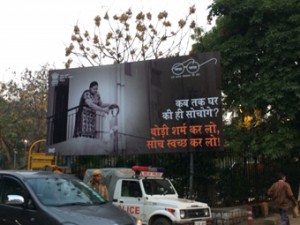Narendra Modi enlists the Mahatma in his ambitious campaign to make India a clean place in five years, ROBIN JEFFREY and ASSA DORON report.
Narendra Modi, India’s powerful new prime minister, chose Mahatma Gandhi’s birthday on 2 October to launch a ‘Clean India!’ or Swachh Bharat campaign. He committed big funding to making India a clean place within five years—by the time of Gandhi’s 170th birthday in 2019.
Modi’s Clean India! goal is admirable. Public spaces in India can be filthy. Open defecation—the result of lack of options and often, in rural areas, of preference—is widespread. More than half the country is estimated to defecate outdoors.
The spread of disease through random defecation increases child mortality and can lead to stunted growth. Household waste is thrown into the streets in many towns and cities and left to sporadic collections and the forces of nature. Rapid urbanisation produces vast amounts of construction and demolition debris. Rapidly growing cities and the consuming middle class generate an estimated 65 million tonnes of garbage a year. (Australia produced 44 million tonnes in 2007; India has 50 times more people).
Mahatma Gandhi was a social reformer, not just a nationalist, and one of his constant invocations was to clean up the country. ‘Nothing has been so painful to me,’ he wrote, ‘as to observe our insanitation throughout the length and breadth of the land.’
For Prime Minister Modi, a cleaner India will signal progress and development. And his clever campaign has political advantages. By putting Mahatma Gandhi, the ‘father of the nation’, at its centre, the campaign enables Mr Modi’s Bharatiya Janata Party (BJP), never closely associated with Gandhi in the past, to celebrate a Mahatma of their own making.

Until now, it was the Congress Party that claimed Gandhi as its own, and Congress politicians in their wilder moments would denounce the BJP’s forebears as opponents—even enemies—of the nation’s father. Not only was Clean India! launched on Gandhi’s birthday, its publicity uses Gandhi’s round steel-rimmed spectacles as a logo. ’Gandhi’s dream—Modi’s mission’, the posters say. The BJP’s Gandhi is the custodian of cleanliness. Gandhi, the apostle of egalitarianism and inter-religious harmony, is covered with a dust cloth and put at the back of the national shop.
In another act of symbol-rustling, Clean India! has taken the street sweeper’s broom as an icon. Such celebration of the broom has an advantage. A broom is the election symbol of the Aam Aadmi [Common Man] Party, a new organisation that has emerged as a serious rival to the BJP in New Delhi and potentially elsewhere—as demonstrated by the party’s spectacular victory in the Delhi National Capital Territory elections earlier this month, when it won 67 out of 70 seats. ‘Who owns the broom?—We do’, appeared to be part of the Clean India! message of Mr Modi’s party.
Photos of Mr Modi wielding the broom aimed to emphasise his humble, lower-caste origins—someone who knows the exhausting scrabble of everyday life. (Recall his oft-proclaimed origins as the son of a teashop owner?)
Most of elite India, who brandished brooms for the cameras, come from higher castes. But most of the people who have dealt with waste in India historically, and largely today too, are Dalits.
India struggles, however, to cope with enduring ritual oppressions and extreme inequalities. The awkward photos of 2 October 2014, in which business, social and political leaders took up the broom, underlined an inescapable ‘do as I say, not as I do’ tension. Written on the faces of some of the broom-wielders was ‘Which end of this thing do I hold and what do I do now?’
Most of elite India, who brandished brooms for the cameras, come from higher castes. But most of the people who have dealt with waste in India historically, and largely today too, are Dalits (Scheduled Castes in bureaucratic language, ‘untouchables’ in the language of long ago) or others of relatively low caste. Much of upper-caste India feels uncomfortable dealing with ‘waste’. In Hindi, garbage can be described as chhuta—‘touched’ or tainted, and people who carry away such things are achhut—untouchable.
The Clean India! campaign aims at a desirable goal. But even if it succeeds, it will produce losers. Millions of people augment their incomes by collecting, sorting and reselling waste. Some are municipal servants, poorly paid but at least on a salary. Other waste collectors are freelancers, paid by individual householders to remove rubbish. People don’t ask where the garbage goes after it leaves their doorstep. Often it ends up in any available open space.

Satisfactory waste management requires investment in technology and infrastructure and enforcement of rules and standards. Many local governments in India are contracting with waste-management corporations to clean their jurisdictions. But corporate waste management requires careful study, segregation of waste, punctuality of workers, regularity of collection and relentless maintenance.
Waste has value. A waste-management company is likely to claim ownership of the waste generated in its territory. A company may incinerate waste in expensive furnaces to make electricity, compost it to make saleable fertiliser and methane gas and recycle the ‘good stuff’—the metals, glass and paper that have fluctuating value.
Enforcement of a company’s exclusive claims drives informal waste handlers off the streets and out of their tiny but vital business. In best-case outcomes, non-governmental organisations or socially far-sighted companies absorb informal waste handlers into the relentless waste systems that modern cities and wasteful middle classes require. But corporate waste-work entails uniforms, punctuality, fixed (low) wages, thoroughness, controlled landfills—and no rights to the things of value that turn up in the daily collections. Not everyone can see the benefits of transforming oneself from a desperately poor self-employed waste-picker to a very poor employee of a no-nonsense capitalist enterprise.
Clean India! is one of the tests that the new prime minister and his BJP government have set for themselves. Can they make the campaign more than a picnic for advertising agencies and photographers? Will it leave, as so many Indian campaigns before it, only a few battered relics and no systematic or cultural change? Will the campaign link the BJP with ‘the father of the nation’ and break the bond that the Congress Party once regarded as securely theirs?
And will it create widespread waste management that is systematic, effective and sustainable—and includes those millions who today eke out a living through the handling of waste?
Robin Jeffrey is Visiting Research Professor at the National University of Singapore.
Dr Assa Doron is Senior Fellow, Anthropology, at the Australian National University.
Main photo:
PM Modi launches the Swachh Bharat Abhiyaan (M. Asokan. Wikimedia Commons).
